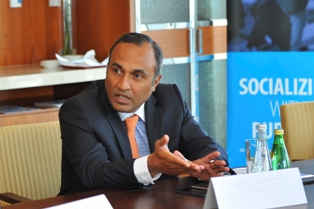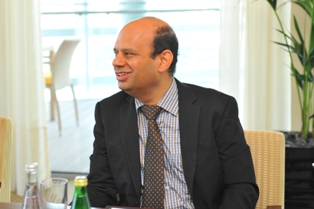For your company to maintain reputable image, excellent service standards and stay in business for the long term, you need to keep a close eye on your trade debtors. Joyce Njeri reports on the highlights from the recent Citi-roundtable forum for CFOs and Finance Managers in the Food Processing and Manufacturing sector.

Chief Financial Officers and Senior Finance Managers from the Food Processing and Manufacturing industry pose for a group photo during the roundtable session, at the Oberoi Hotel in Dubai.
THE REGIONAL economy is slowly starting to bubble again and along with the ever increasing numbers of super cars that are out and about, our memories seem to fade.
We remember the good times again and see them just around the corner. The big contracts, the constant stream of revenue and of course the bonuses. What seems to be fading from our minds is the famine that followed the feast. Many came to dine and many disappeared without paying the bill leaving the host with leftovers of little value.
Sector overview

“Without a clear credit policy, the financial statements of companies will lack true and fair outlook” – Vincent Valladares, Managing Director, Middle East Head, Citi Commercial Bank.
As with any other industry sector, the Food Processing and Manufacturing sector is lubricated by offering credit to their customers and being granted credit by their suppliers. The key being to balance the two to ensure adequate cash is available to fuel the business engine. Has the region learnt from the mistakes of the past? In part, yes. Not entirely.
It is against this background that Accountant Middle East magazine in conjunction with Citi Commercial Bank once again hosted another round of invigorating discussion forum that targeted CFOs and Senior Finance Managers in the Food Processing and Manufacturing industry.
The moderator Andy Yiacoumi, who is a renowned Credit Management expert with deep roots in the F&B industry used an innovative approach to help money managers – drawn from the Processing, Packaging, Distribution and Hospitality Services sectors – identify the gaps in their approach with respect to Credit Risk and Debt Collection within their respective jurisdictions.
Roundtable objective
Dubai has a vibrant F&B sector which includes suppliers, distributors, food caterers, restaurants, bars, fast food restaurants, cafes, snack bars, cocktail lounges and numerous coffee shops. According to the Department of Economic Development (DEDD), the sector is the most dynamic and high-growth segment that forms an integral part of Dubai’s economy. This creates a lot of competition in the sector, which is driving higher levels of innovation, service and quality standards. On top of that, the sector is characterised by high business costs primarily in materials, food products, labour and rental costs.
For businesses to maintain reputable image, excellent service standards and stay in business for the long term, finance managers need to keep a close eye on payments to suppliers, and the payments from customers who owe the business money. Therefore the objective of the roundtable was to discuss the dynamics of credit risks and also help participants develop easy-to-use templates to form part of their regular debt collection procedure.

“The world of cash management has now moved on from debt collection to credit management” – Ayman Fouad, Deputy Finance Manager, Emirates Modern Poultry Company.
Andy, whose regular menu of matters include helping clients deal with delinquent accounts receivables, vendor disputes, customer disputes, contract disputes, governmental compliance and regulatory complaints, opened the discussion by addressing the pros and cons of trading on credit.
“In their attempt to make a profit, businesses adopt several strategies, one of which is allowing credit to customers. Trade credit therefore arises when customers are allowed to buy goods or services and payment deferred till later date,” Andy explained.
“Of course granting of credit leads to temporary deprivation of the company’s funds, however, it is not a bad thing,” said Andy, adding “If properly managed, credit sales actually enhance both profitability and liquidity positions of firms.”
Granting of credit continues
There is an appetite amongst the industry players to ensure that they are well placed to gain from the expected revenue gains as well as preparing to avoid the substantial losses that parts of the sector sustained in the past. According to Vincent Valladares, Managing Director, Middle East Head, Citi Commercial Bank, granting of credit continues unabated, but with caution.
“Whether in the banking sector, manufacturing or hospitality sector, the issue of credit has every cause to be given reasonable attention, considering high cases of liquidation of some businesses in recent times, due to the effect of bad debts brought about by customer defaults,” Vincent said.

“The proportion of credit sales is mostly influenced by variables like the nature of business and the presence of business competition” – Syed Turab Mehdi, Finance Manager, Arabian Farms Company.
He also emphasised on the importance of businesses having a solid credit policy, saying “Without a clear credit policy, the financial statements of such companies will lack true and fair outlook, because of the fact that the amount of trade debtors cannot be fully realised.”
“Whether your debtors are of high risk class or are deemed as credit worthy customers, the impact of the credit policy laid down by management will largely determine how you manage your credit sales,” said Vincent.
Granted, some companies do not grant credit and a few that do merely allow only a small portion of their total sales as credit sales. The reasons sometimes given by the firms include… past experiences, insufficient information about the customers, or the companies are just being cautious as they are not certain whether the credit will be paid on terms agreed upon.
“It has not been an easy task for my company to grant credit to customers because of the costs associated with credit sales and also due to some past bitter experiences,” revealed Kris Arkay, the Finance Manager of Zurich Foodstuff Trading.
Associated risk elements
Kris caused laughter when he narrated about a customer who defaulted on his debts and his company had to take extreme measures by entering into a barter-exchange of some goods with the customer, even though the two firms were in different kinds of trade.

“Some customers deliberately fail to disclose their financial position and will delay payment in order to benefit their cash position at the expense of others” – Chirag Oberoi, Finance Manager, Al Wazan Foodstuffs Factory.
Andy intervened; “There are many different types of customer, small, large, local or international. All of them have different risk elements associated with them. Do we even know what the risk elements are and how are we managing them?”
“Just because a customer has no ability to pay today does not necessarily mean that they will be in the same position in a few months or a few years’ time. We should therefore ensure that we are constantly monitoring our customers and the associated risk without jeopardizing valuable revenue streams.”
Chirag Oberoi, Finance Manager, Al Wazan Foodstuffs Factory, lamented on the difficulties of obtaining customers’ background information before granting credit, saying most clients either offer misleading statistics or refuse to disclose any material at all.
“Looking at the information available about our customers both current and historical defines the future risk elements. However, some deliberately fail to disclose their financial position even though they are often fully aware of the cost of working capital and will delay payment benefitting their cash position at the expense of others who are not quite so vigilant,” Chirag said.
Ian Sherlock a Partner with Middle East Credit Management Institute (CMIME), explained that granting of credit leads to creation of trade debts in business which can be classified into good or bad debts.

“What I have observed lately is that some businesses do not offer credit at all. They require customers to make payment at the time of delivery or sale” – Shoukat Zaman Khan, Financial Controller, Coffee Planet LLC.
“Bad debt arise when the business is unable to collect its accounts receivable and in this regard, companies should consider engaging the services of factoring agents as it will reduce the incidence of bad debts losses and other associated costs of credit,” he said.
Austerity measures
Not all economies are expected to see the same uplift as the UAE in the short term. With parts of the customer base being based in countries with cash strapped governments and austerity measures, how safe are the sales granted on credit going to be? Do we need to look at some form of security either through factoring or credit insurance?
“Yes these options have a cost, but they are quantifiable costs that can be factored into the business model,” Ian added.
He further explained there’s no particular universal credit policy that should be adopted by every organisation, as granting of credit largely depends on the current economic conditions, the degree of risk involved, the nature of the business and its cash flow circumstances.
“Granting of credit ties up or blocks the firm’s funds that could be used in the daily running of the business. It involves an element of risk that should be carefully managed, therefore, you should view your debtors as an investment,” he said.
Another participant, Anil Jain, the Finance Head at Baqer Mohebi Enterprises LLC extolled the benefits of trading on credit, but cautioned that it should be carefully managed.
“When you grant credit to your customer, it means the incurring shortfall has to be financed out of the company’s working capital. Alternatively, the firm can seek funds from banks or other sources. Just like other receivables, substantial amounts are tied up in debt and it needs proper management,” Anil said.
Business variables

“When you grant credit to your customer, it means the incurring shortfall has to be financed out of the company’s working capital” – Anil Jain, Finance Head, Baqer Mohebi Enterprises LLC.
Shoukat Zaman Khan, Financial Controller, Coffee Planet LLC, asked the all-important question about the true cost of granting credit to customers.
“What I have observed lately is that some businesses do not offer credit at all. They require customers to make payment at the time of delivery or sale; while some ask for the payment to be made in advance,” he lamented.
Syed Turab Mehdi, Finance Manager, Arabian Farms Company, reminded him that prevailing economic conditions and other business variables may be the cause of such measures.
“Financial managers hardly have any control over these variables and therefore they need to work together with managers in other divisions like the marketing and purchasing arms of the firm,” Turab Mehdi explained, saying “The proportion of credit sales is mostly influenced by variables like the nature of business, presence of business competition and the gap between demand for and supply of the product or service in question.”
Andy interjected: “The fundamental question that must be asked is, what are we in business for, revenue or sustained profitability? Many will say both, but to achieve the later the costs have to be managed also. Granting credit to customers costs. The true cost of delayed and at worse non-payment is rarely examined in detail by most organisations. Does a boom period grant us an opportunity to manage this cost? Do we need to look at the role of our sales teams in helping sustain profitability?” he posed.

“It has not been an easy task for my company to grant credit to customers because of the costs associated with credit sales and also due to some past bitter experiences” – Kris Arkay, Finance Manager, Zurich Foodstuff Trading.
Vincent advised that credit sales must be well monitored because “if there are no measures put in place to regulate purchases made to customers on credit, there could be problems especially those related to liquidity and cash flow,” he said.
“Adequate flow of cash and profitability position are the two basic factors that sustain a business in the present and determines its position in the long term. Therefore, management of the working capital presumes the effective use of trade debtors to ensure increased profitability and liquidity in the business,” Vincent added.
Defaulting customers
Having properly trained staff to deal with delayed payments, delinquent and defaulting customers is of paramount importance. It often seems that the credit and collections teams are the ‘bad guys’ when it comes to collecting the outstanding invoices. Either they are not collecting enough or they are being too hard on the customers. Or it may be that the bad debts are too high and they are not approving enough new customers. So, how is their role defined? Are they debt collectors or do they have an active involvement in the full customer life cycle?
“Key to good customer service is communication,” Ian Sherlock said, adding “This is especially so when there are problems with the customer relationship, whether it be service related or payment related.”
“As finance managers our role in business continues to grow from one of reporting financials to a more prominent role of strategic guidance and business planning. As we help the business to build on the present and plan for the future we are required to look for quality personnel to fulfill our growing list of duties. This may be in tax, treasury, accounts payable and also credit control,” Ian added.

“It is a challenge trying to balance customer relations while ensuring that payments are made according to terms” – Mahmoud Mamdouh, Senior Accountant, Emirates Dates Factory.
The issue of debt collection whipped up a heated debate, with a number of money managers agreeing that it is a challenge to their businesses, trying to balance customer relations while ensuring that payments are made according to terms.
“We know that we want to increase the amount of collections from our sales, but do we really have a plan? Do we just recruit more people to send emails and make phone calls?” asked Mahmoud Mamdouh, Senior Accountant, Emirates Dates Factory.
“In some case yes, however this can be a reactive approach,” Andy answered, adding “We should have a balanced approach to reducing overdue debt by collection activities as opposed to through preventative measures taken earlier on in the customer relationship. We are used to having to set and monitor budgets but we are often not so effective at setting and managing our budgeted debtor levels and the hidden costs associated.”
“Therefore, the importance of the actions taken by a business to grant, monitor, and collect the cash for outstanding accounts receivable cannot be over emphasised, because it is a factor that has a strong influence on the cash inflow from its sales activities which is very critical to its survival,” Andy added.

Roundtable moderator Andy Yiacoumi from the Middle East Credit Management Institute, used an innovative approach to help the money managers identify gaps in their approach with respect to Credit Risk and Debt Collection.
Still on debt collection, Ayman Fouad, Deputy Finance Manager, Emirates Modern Poultry Company said that the world of cash management has now moved on from debt collection to credit management.
“The key questions we need to ask ourselves are, is our current collection strategy delivering for the needs of the business in an efficient and cost effective manner? What other cash management strategies are available? We are required to be able to answer all of these questions and many more.”
“Finance is a diverse function with many skills that draw on our technical and managerial expertise. Our desire to see the business succeed also drives our desire to understand and develop our expertise in the many facets of finance,” Ayman added.












